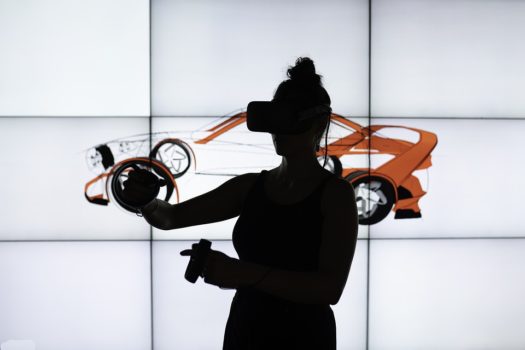
There are quite a handful of platforms that allow you to develop virtual reality and augmented reality apps and content, but it is not easy to find an offline virtual reality school or academy with which to train for those interested in developing AR and VR apps.
Udemy may be the popular place to learn VR and AR, but there are other free or cheaper subscription options.
The first step in signing up for a tutorial or class or certificate to learn to develop content or apps for VR and AR would be to understand the most common VR and AR platforms being employed in individual and enterprise scale.
Although Unity 3D is undoubtedly the most common and trained standards for developing and deploying augmented and virtual reality application for both beginner or expert developer, it is cannot be employed for developing content for some headsets. Unreal Engine 4 is also an industry standard although it has a steeper learning curve than Unity. You also give 5% of net revenues per quarter although its free to use. Both are free to download and try.
This brings the point home about the need to learn how to develop content on other platforms. Examples are HTC Vive, Oculus Rift, Cardboard and other that are now very popular VR platforms for building experiences. Google VR SDK is popular for building virtual reality applications for Android and iOS. WebVR is also becoming a formidable force for those who love HTC Vive, Oculus Rift or Google Cardboard, in a web browser.
Vuforia, a free to use development kit which supports many devices including Tango phones, EasyAR, ARKit for Apple devices; and ARCore from Google, Oculus and OpenVR, are also popular options these days. Other tools of interest to those wanting to developVR and AR experiences are Vizor for exploring, creating and publishing VR on web.
The best place to start when interested in developing augmented and virtual reality experiences are the several free and paid online courses, tutorials and certification programs. You can learn general ideas for instance how virtual and augmented reality works, learn to create VR and AR apps using various development tools, and tools you can use to develop.
Circuit Stream
Circuit Stream has been focused on teaching AR/VR development since 2015. Over 30,000 students have attended their workshops, corporate training programs, and XR Development with Unity course. Beyond focusing on education, they also offer development services and a platform that makes it easy to manage, deploy and scale AR/VR applications.Â
The XR Development with Unity course is a beginner-friendly 10-week long program delivered live online. Students learn the fundamentals of augmented and virtual reality development through project-based lessons and one-on-one mentorship.Â
Cohorts run every two months and students work on a personal project or idea during the course. 1-on-1 mentorship hours are used to work with a dedicated instructor on the personal project or to explore a topic they are most interested in. For example, if a student wants to develop a business solution on HoloLens 2, she would learn the fundamental principles of development in the regular class hours while using the 1-on-1 sessions to build an application for the HoloLens 2.Â
All instructors are VR/AR developers and Unity certified instructors. Circuit Stream is a Unity certified training partner. Training partners are approved based on their expertise, focus on quality education and commitment to providing the highest level of training available.
Circuit Stream also offers multiple free live AR and VR workshops every month and a number of on-demand workshops accessible anytime.Â
Coursera
At Coursera, you learn fundamentals of Augmented Reality starting with the course The Introduction to Augmented Reality and ARCore which helps you learn how to build AR experiences using ARCore. It is delivered online, free charge without certification, and takes only four weeks. Those wishing to receive a certificate at the end of the course can pay $29.
With this course, you learn how to identify different types of AR experiences, how to use Google Poly and Unity platforms and tools in building AR, and exactly how to do that. It is covered in 4 weeks in about 11 hours total. Introduction to Augmented Reality is covered in week 1, basics of AR functionality in week 2, taking the next step with ARCore in week 3, and bringing ARCore to life in week 4. From the course welcome page, you can track the amount of time left for all the weekly tasks and know how far you are from the schedule.
You basically start completing tasks such as watching online videos, readings, and practice exercises.
If you are interested, Coursera also provides recommendations about the VR reality courses you can take if you fill in your profile as a VR professional during the signup process.
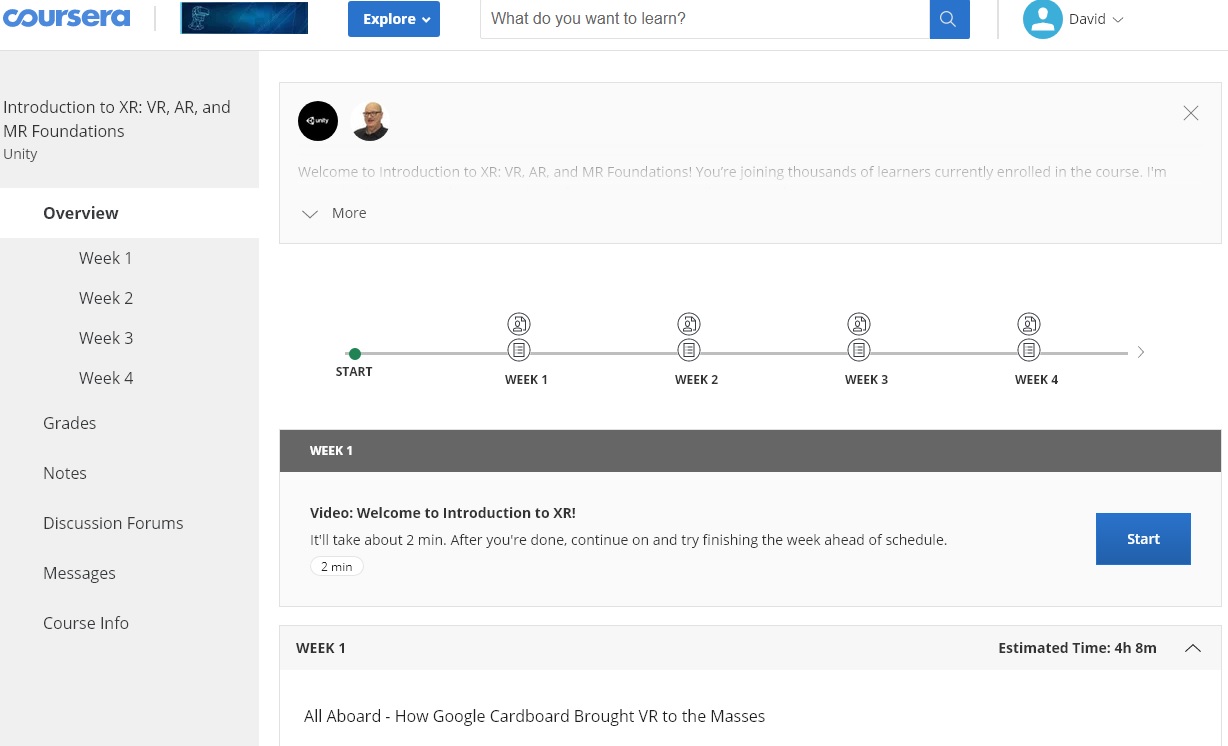
The Unity XR: How to Build AR and VR Apps Specialization course at Coursera offers three shorter courses about VR and AR. The Introduction to XR: VR, AR, and MR Foundations, one of the three shorter courses, takes 17 hours to see you learning and actually developing two tracks. Currently, you can sign up for a 7-days free trial period where you get full access to training and course materials.
The Mobile VR App Development with Unity course teaches learners how to design, develop, troubleshoot and publish their own mobile VR applications in Unity for Google Daydream, Gear VR, or Oculus Go devices using latest techniques. The Handheld AR App Development with Unity teaches learners how to develop their own mobile VR applications in Unity for iOS and Android devices using ARKit or ARCore.
You can also learn to and make your first VR game at Coursera in only 23 hours for two to four hours per week. This course is the final part of a series of the three courses. After the course, you would learn to create your own experiences but only supposed to be an entry to professional VR development.
The entire course with its three shorter courses takes five months to complete and is free to enroll starting this week. There is the option for funding.
Coursesity
Coursesity has several free tutorials and courses in AR including introduction to building in ARCore, and using of Sceneform to build AR experiences for AR and non-AR apps without having to use OpenGL, and using of Unity to build AR experiences in ARCore.
Also, besides learning the basics of virtual reality and 3D interactions led by tutors from University of London and Goldsmiths, you get to learn the tools and techniques employed in developing professional virtual reality apps in Unity 3D. The course trains you how to create virtual reality experiences on over seven major headsets and devices with Unity 3D, and how to set up HTC Vive within Unity game engine. It features general videos, tutorial videos and a VR project that a s student should undertake.
I tried to enroll on this one and it feels easy to sign up and undertake. With the free access, you access all the training materials from understanding VR and 3D environments to 3D UI and locomotion, and you get quizes to practice your understanding of the materials. However, the free access does not provide graded assignments or unlimited course access.
At the cost of $99 you pursue a certificate that offers unlimited access to course materials, graded assignments and projects, and you can add the certification to your CE or resume or post directly to LinkedIn.
Edx.org
Edx.org is an online learning destination founded by Harvard University and MIT in 2012. It provides many programs, but there is one VR certification program I found of interest. It is named Professional Program Certificate in Virtual Reality (VR) App Development (UC San Diego). This course teaches how to design and implement successful interactive VR software using OpenGL industry standards. It teaches, in 18 weeks either on full-time or part-time basis, how a student can develop their own VR app and AR app using the same program.
A professional certificate in this Virtual Reality (VR) App Development course costs $267.30 and takes five months to complete, and includes the two introductory courses, each of which has a $99 certification option. With it, learners gain skills on designing VR applications with Unity 3D, OpenGL, and VR hardware. To get admission, you fill the form in the link above.
Besides, Edx.org has variety of other courses including Digital Design and Computer Graphics.
EON Reality
EON Reality is broader than just teaching people how to develop for VR. Ideally, the company allows users to create XR content for education and training. Users can create experiences and then publish them for other people to use them for learning or use them for training. Already, they have a VR publishing library hosting thousands of 3D and 360 degree environments and assets which those willing to either immerse into for exploration or to learn VR, can browse and enjoy.
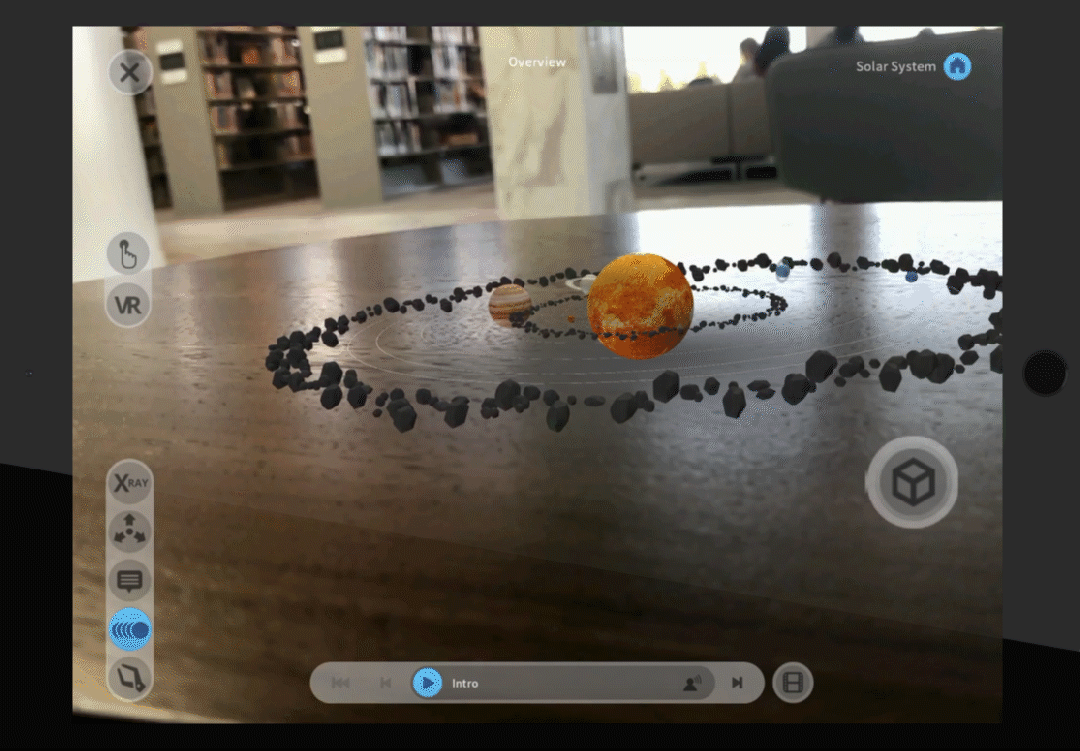
Some of these can be imported into your projects. In this way, it acts like many other VR publishing platforms where you can derive objects for your projects, but also a good learning resource for those developing for VR. Creating content on the platform is easy and you do not require any coding experience or advanced knowledge. The content is then published for audience which includes students, trainees, employees, or general public.
Also, at EON Reality, you can participate in contests, for instance the AVR Global Classroom Challenge for students around the world, which challenges students to create engaging VR environments using the using EON Reality’s code-free AVR Platform.
The platform, which also works on Windows, Android and iOS, supports full AR and VR functionality on tablets, smartphones, and desktops. Hence the content can be viewed across all major devices.
Lynda.com
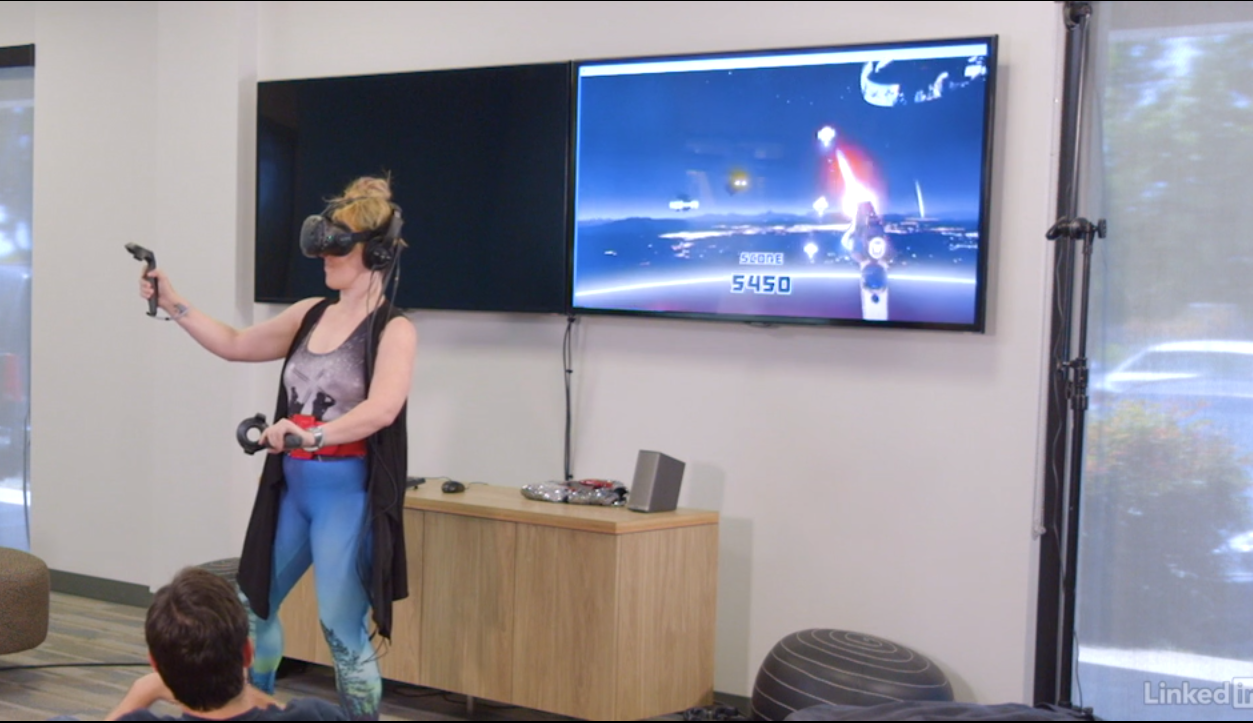
The Virtual Reality Foundations course on Lynda will teach complete foundational stuff about VR, its applications and how to develop content and apps for VR. It is delivered by Craig Barr who also teaches another one named Virtual Reality Overview for Developers targeted at developers who need to learn the tools they can use to develop for VR. He teaches yet another course on how to tackle different VR projects using Google VR for Android.
Lynda is now LinkedIn Learning and all content and expert instructors are now on LinkedIn Learning. With a free month subscription at LinkedIn, you get to take this and other courses offered at the LinkedIn Learning through Lynda. That means you would have to subscribe on LinkedIn premium account which can be activated immediately for a 30-day trial period after you submit payment information.
Packt
Building your First VR Experience with Unity [Integrated Course] at Packt takes only five hours and is offered online. For a RRP €118.99 Packt subscription, you gain adequate skills to navigate the Unity interface, get to script your first C# component, get to build VR experience on Unity for the first time, and you also get to layout a simple UI for your app.
Packt provides a strong foundation in 3D modeling, C# coding, interaction design, SDK use and general practices for VR.
The course video, whose preview is shown below, costs €23.80 but also you can do a free 10-day trial to take the course. The code files are also free to download. Packt allows you to access this course on their free trial subscription and you get to submit your payment details to pay when the free subscription ends.
Udacity
Udacity is a popular training platform that focuses on VR mobile development, core Unity game engine and C# development. With their four-months VR Mobile Nanodegree program, you learn the latest tools and technologies that you can use to develop VR, including Google, Unity, and HTC.
You learn fundamentals of VR design such as ergonomics, user testing, and interface design so you can have foundation to approach any VR design tasks. You also get to complete a series of VR challenge during the course.
Other skills taught during this course include pre-production of 360 media, and optimizing mobile performance for instance mitigating heat issues. After the USD 999 course, you can pursue a career as a Mobile AR/VR Developer, Unity Developer, Web, Android & IOS Developer, 3D programmer, game designer and creative director.
You only require intermediate computer skills to enroll for this course, as well as file management skills, working knowledge of Unity and beginning to intermediate experience with object-oriented programming.
Udacity also provides a free Introduction to Virtual Reality course by Google VR, which is a two-weeks course that teaches beginners how to code for VR before they can become advanced VR developers. No programming experience is needed.
Udemy
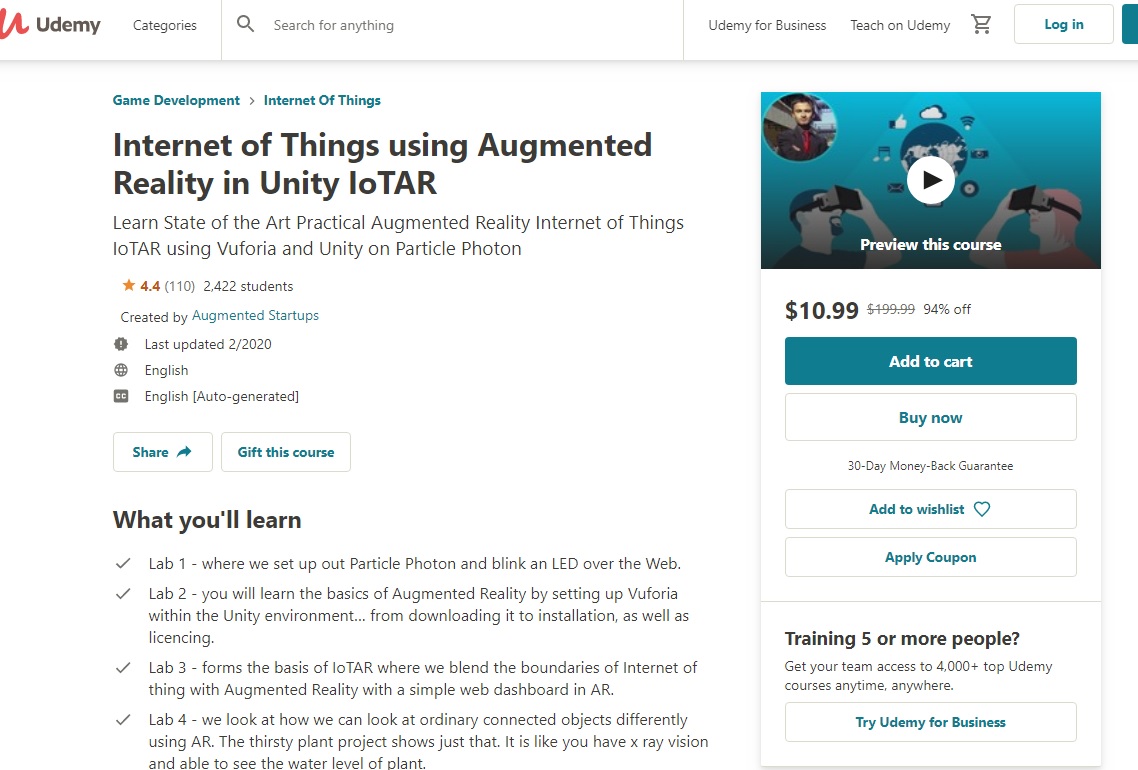
Udemy’s The Complete Virtual Reality Game Development , for only $10 after current discount, teaches you how to develop games and apps on Oculus, Gear VR, HTC Vive/OpenVR-compatible headsets, and Google Cardboard (Android and iOS) as well. It is taught by the course author Pablo Farias Navarro who is also a game developer since 1996, and is also founder of ZENVA where he has taught +250,000 students and authored +50 courses.
During the training, you also get to practically develop two example projects or experiences named “Flying platform experience†and “Night with mosquitos experience.â€
VR game developers can also learn C# at beginner level, to help develop VR experiences.
Another course named how to make VR experiences with Unreal Engine in C++ will train you how to develop apps for Oculus Rift and Steam VR.
You learn to recreate common mechanisms of VR games such as teleportation, spatial UI and object orientation. You also learn to choose most suitable mechanisms for your own games and projects. The course is developed by gameDev.tv team in collaboration with Epic, which deals in development of games, and is delivered online.
The Internet of Things using Augmented Reality in Unity IoTAR course, also from Udemy, teaches learners skills to build AR Internet of Things experiences using Vuforia and Unity on Particle Photon. In  34 lectures, you learn applications of AR Internet of Things in health and other areas such as in visualizing temperature of any liquid chromatically.
The Oculus Quest and Unity at Udemy is designed for beginner Unity game developers willing to start with VR games and Oculus Quest headsets.
The complete Virtual Reality game development course helps you to master development of virtual reality games and building of immersive experiences with Unity platform. Developed by Zenva Aacdemy, learners undergoing the course will put together a simple game and cover the building process of in Unity for all the main desktop and mobile VR platforms such as Google Cardboard, Gear VR, Oculus, hTC VIVE.
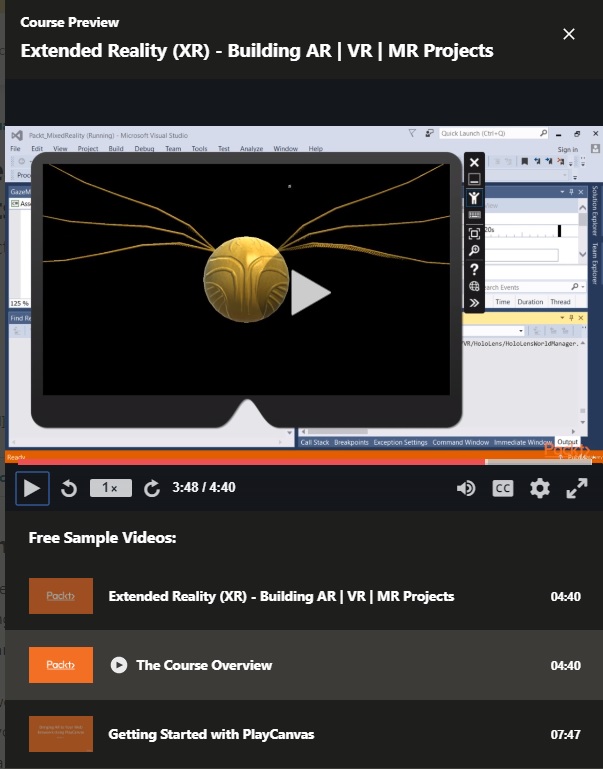
The Extended (XR) Building AR/V/MR Projects course allows you to gain skills needed for building your own VR/AR/MR apps with 3D game development. You get an in-depth understanding of the complex VR/AR/MR landscape and learn how to build apps with state of art tools.
During training, you get to create apps using PlayCanvas engine, and even create a 3D world and deploy 1st VR app on mobile. You also get to publish and deploy applications on various hardware devices, and create their first iOS app using Scenekit, which is a high level 3D graphics framework.
The course equips you with the needed skills to deploy AR to web browsers using PlayCanvas, create AR apps using iOS ARKit, creating VR experiences and visualize in google cardboard or DayDream, and skills in Mixed Reality with Microsoft hololens.
The course is designed to equip developers with the skills to be able to take up the challenges in VR development. At the end of the course, learners will have created their own projects on the major platforms and are ready for future.
If you are getting started in VR, Building your first VR experience with Unity is a five-hour series of lectures at Udemy that will show you how best to do it. The course will guide you on how to craft your first VR app and acquire strong foundation in 3D modeling, C# coding, interaction design, SDK use, and general best practices. You learn via example how to build using Unity3D.
The course lets you learn how to lay a simple UI for your first app, interact with VR and script C# component, and you learn professional workflow tricks and shortcuts and techniques used by professionals. The other thing is that it comprises of 52 lectures plus 1 downloadable resources and 4 articles plus full time access.
The Unreal Engine 4: Project Based VR Course for Arch Viz in UE4 course helps learners to prepare their 3D models and import their project into a game engine, incorporating lighting, animation and more.
During this course, learners learn to generate photo-realistic and instant rendering and animations of their models using UE4, learn blueprints and scripts, set up models as VR experiences, and all this is done with more than 80 lectures, more than 9 articles and 5 downloadable resources.
React VR – Creating Virtual Reality Apps course aims at helping you to become a demand software engineer who is capable of creating VR apps. You learn VR development using React.js, ReactVR, ES6, JavaScript and more. You gain skills on building applications that deal with web requests and APIs. You get to develop shapes in React VR, Models and Animation, Weather Simulators etc.
Build Virtual Reality Games for Android and iPhone VR online course is designed for people who want to learn building VR apps for Android and iPhone using Unity. Learners get to learn how to quickly build and publish VR games on Android and iPhones, convert existing games into VR ones, and reusing of VR waypoints.
All of these courses cost only $11 to $12 each with the current discount offer from a normal of $109.99.
University of London
The University of London offers a BSc Computer Science degree with an option to specialize in Virtual Reality, which is an online distance learning course very relevant to those interested in VR and AR.
It is delivered through Coursera and takes three to six years. Students get to specialize in computer graphics, animation, immersive interaction design and virtual reality. You can also choose other specializations apart from Virtual Reality, including Games Development and web and mobile development.
Since Coursera is not allowed to offer its services to United States citizens, U.S. citizens who are interested in learning VR and other computer-related specializations in this category can use this course to gain these skills.
Skillshare
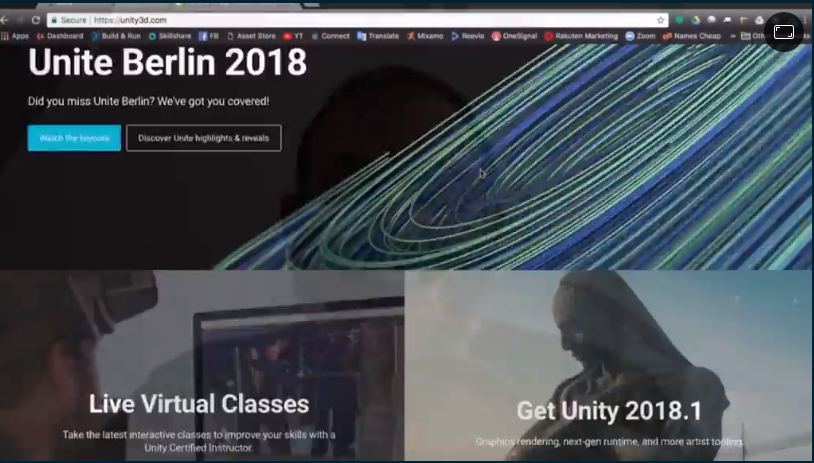
Skillshare is a place where people get to share ideas and learn anything online. It is full of lessons and tutorials about how, for free, you can better your virtual reality and augmented reality skills, starting with the course named Development of AR apps using Vuforia and Unity, another one that teaches how to build Augmented Reality games, and a third one that teaches learners how to build Vuforia Augmented Reality apps using Unity SDK.
You can also get several free courses for which you can sign up and learn to develop virtual reality with Unreal Engine, WebVR and Unity 3D and VR experiences for Google Daydream.
- OpenSim active users hit all-time-high for the holidays - December 15, 2023
- OpenSim user activity ramping up for the holidays - November 15, 2023
- OpenSim land area at a new high as grids prep for holidays - October 15, 2023
